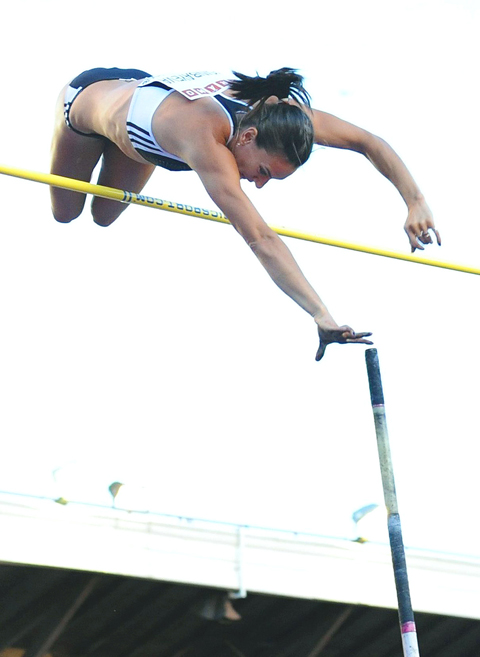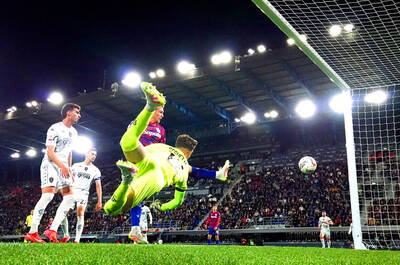Asafa Powell took on the world’s fastest man with every intention of beating him to the finish line.
After a weak start, Usain Bolt just couldn’t catch up in time.
Powell capitalized and edged the world record-holder by one-hundredth of a second, leading from start to finish in the 100m at the DN Galan meet on Tuesday.

PHOTO: AP
Powell, the former world record-holder, won their highly anticipated rematch in 9.88 seconds. Bolt, who was slow out of the blocks, nearly caught his fellow Jamaican at the finish line. Third went to Norwegian Jaysuma Saidy Ndure in 10.06.
“I was really happy with the race,” Powell said. “My goal was to win. My start was quick and fast. And the speed stayed with me through the finish. I’m really looking forward to the Olympics.”
The win was a measure of revenge for Powell, after losing to his close friend Bolt at Jamaica’s Olympic trials last month.
Bolt set the world record of 9.72 seconds in New York on May 31, breaking Powell’s mark of 9.74.
It was Powell’s third straight win at Olympic Stadium.
Last year, he won in 10.04 seconds. In 2006, he set the stadium record of 9.86.
“I needed today’s win for my confidence,” Powell said. “That is most important in order to get really good times.”
Bolt was somber.
“I’m disappointed,” he said. “My start was not good enough. That was the key tonight. I was also disturbed by the false start. I could not focus at 100 percent.”
Earlier, Dayron Robles missed his world 110m hurdles record by just 0.04 seconds, winning the race in 12.91.
The Cuban, who set the world record last month in Ostrava, Czech Republic, beat four Americans in the race.
David Oliver (13.04) and Aries Merritt (13.33) also made the podium.
For setting a new Olympic Stadium record, Robles earned a 1-carat diamond worth US$10,000.
Robles’ time is the fourth fastest in history, tied with Colin Jackson of Britain.
Liu Xiang of China ran a 12.88 and Dominique Arnold of the US clocked 12.90 in 2006.
Yelena Isinbayeva and Meseret Defar of Ethiopia also set stadium records.
Isinbayeva cleared 4.85m to win the women’s pole vault and her second diamond in Stockholm. The Russian broke her world record in Rome last week with a 5.03m effort.
“It was a good competition, but a little bit too cold when I tried at 4.95,” she said.
Defar missed fellow Ethiopian Tirunesh Dibaba’s world 5,000m record by 1.45 seconds, winning the race in 14:12.60 for another stadium record. Dibaba set the world record in Oslo, Norway, last month.
Olympic champion Jeremy Wariner won his third straight 400m, but failed to improve the stadium record he set last year.
The American eased up near the finish and crossed in 44.29.
The time was 0.39 off Wariner’s meet record that earned him a diamond last year.
Running in nearly perfect conditions, Wariner took the lead early in the one-lap race and was unchallenged the rest of the way.
“I went for victory today,” he said. “It’s a good winning time. Now I’m going home for tough training before the Olympics.”
Chris Brown of the Bahamas finished second in 44.53 and Ricardo Chambers of Jamaica third in 44.84.
Abubaker Kaki, a 19-year-old from Sudan, picked up the first diamond of the evening by winning the 1,000m in 2:13.93. He also got his name engraved on a large silver trophy, the Dickson Trophy, which was first contested in a mile race in 1895.
“It was my first 1,000 [outdoors] ever,” Kaki said. “I tried to beat the world record, but it’s very hard to beat.”
Still, I’m very happy with my performance,” he said.
Previous winners of the Dickson Trophy include British great Sebastian Coe, the London Olympic 2012 chairman who watched the race from the stands as a guest of honor, John Walker of New Zealand, Filbert Bayi of Tanzania and Said Aouita of Morocco.
Saad Youssef Kamel of Bahrein finished second behind Kaki in 2:14.72, and Yuriy Borzakovskiy of Russia third in 2:15.50.
Craig Mottram of Australia won the 3,000m in 7:37.73, nearly a second ahead of runner-up Isaac Songok of Kenya.
“It was a good race,” Mottram said. “I didn’t care much about the time. I just arrived from Australia. I was a bit unsure about my shape.”

Bologna on Thursday advanced past Empoli to reach their first Coppa Italia final in more than half a century. Thijs Dallinga’s 87th-minute header earned Bologna a 2-1 win and his side advanced 5-1 on aggregate. Giovanni Fabbian opened the scoring for Bologna with a header seven minutes in. Then Viktor Kovalenko equalized for Empoli in the 30th minute by turning in a rebound to finish off a counterattack. Bologna won the first leg 3-0. In the May 14 final in Rome, Bologna are to face AC Milan, who eliminated city rivals Inter 4-1 on aggregate following a 3-0 win on Wednesday. Bologna last reached the

If the Wild finally break through and win their first playoff series in a decade, Minnesota’s top line likely will be the reason. They were all over the Golden Knights through the first two games of their NHL Western Conference quarter-finals series, which was 1-1 going back to Minnesota for Game 3 today. The Wild tied the series with a 5-2 win on Tuesday. Matt Boldy had three goals and an assist in the first two games, while Kirill Kaprizov produced two goals and three assists. Joel Eriksson Ek, who centers the line, has yet to get on the scoresheet. “I think the biggest

From a commemorative jersey to a stadium in his name, Argentine soccer organizers are planning a slew of tributes to their late “Captain” Pope Francis, eulogized as the ultimate team player. Tributes to the Argentine pontiff, a lifelong lover of the game, who died on Monday at the age of 88, have been peppered with soccer metaphors in his homeland. “Francisco. What a player,” the Argentine Football Federation (AFA) said, describing the first pope from Latin America and the southern hemisphere as a generational talent who “never hogged the ball” and who showed the world “the importance of having an Argentine captain,

Noelvi Marte on Sunday had seven RBIs and hit his first career grand slam with a drive off infielder Jorge Mateo, while Austin Wynn had a career-high six RBIs as the Cincinnati Reds scored their most runs in 26 years in a 24-2 rout of the Baltimore Orioles. Marte finished with five hits, including his eighth-inning homer off Mateo. Wynn hit a three-run homer in the ninth off catcher Gary Sanchez. Cincinnati scored its most runs since a 24-12 win against the Colorado Rockies on May 19, 1999, and finished with 25 hits. Baltimore allowed its most runs since a 30-3 loss to